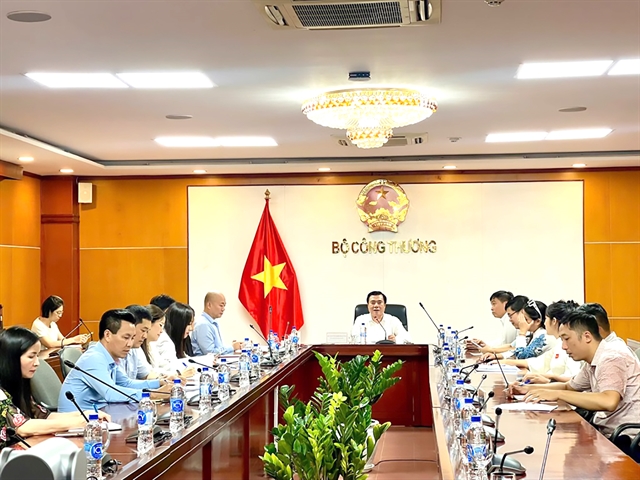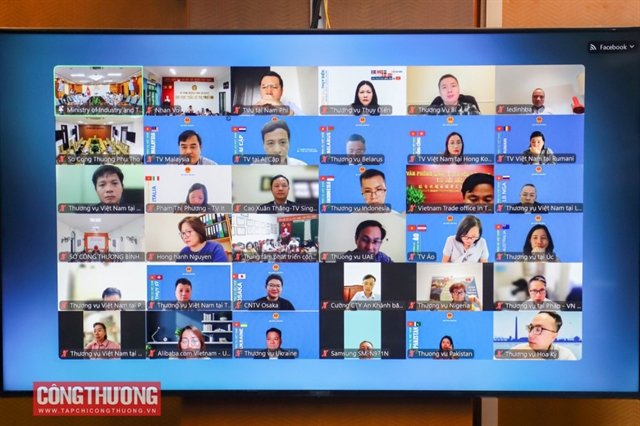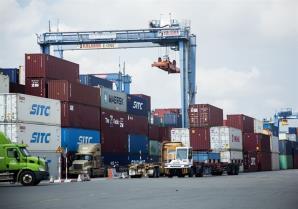Expanding markets through digital platforms: Việt Nam steps up trade promotion efforts
Closer coordination between associations and Việt Nam's overseas trade offices to enhance early warning mechanisms for policy changes and technical barriers should be also included. Such efforts would enable businesses to adjust promptly and better prepare for international trade risks.

HÀ NỘI — Deputy Minister of Industry and Trade Nguyễn Sinh Nhật Tân has called on trade promotion agencies, overseas trade offices and business associations to accelerate digital transformation in trade promotion, aiming to enhance competitiveness and expand markets for Vietnamese products and brands.
During a meeting with Việt Nam's overseas trade offices in Hà Nội on Tuesday, Tân emphasised the importance of closely monitoring market trends, updating Vietnamese enterprises on new opportunities and alerting them to changes in policies, technical barriers, cybersecurity rules and quality standards that could affect product access to global e-commerce platforms.
He also tasked relevant units with developing and regularly updating handbooks on digital commerce platforms in key markets. These resources will guide businesses on participation procedures, required technical standards and effective product introduction channels.
In addition, trade promotion offices abroad were encouraged to work with consulting firms and reputable law offices in host countries to help Vietnamese companies register intellectual property rights, resolve commercial disputes and safeguard their legitimate business interests.
Meanwhile, the deputy minister asked business associations to design trade promotion programmes tailored to the capacities of businesses, enabling them to take advantage of digital trade opportunities in developed markets such as China, Europe and the US. The aim is to foster cross-border trade and strengthen Việt Nam’s participation in the global supply chain.
He noted that associations should play a greater role as bridges for member companies, helping them improve trade competitiveness through digital transformation. Associations were also advised to strengthen connections with overseas trade offices, diplomatic agencies and development partners to expand access to foreign markets, thereby boosting the global reach of Vietnamese products.
Associations were also tasked with gathering and relaying legal, technical and commercial challenges faced by exporters, particularly small and medium-sized enterprises (SMEs), to relevant authorities. This feedback would form the basis for policy adjustments and support measures to facilitate smoother export activities, he said.
Closer coordination between associations and Việt Nam's overseas trade offices to enhance early warning mechanisms for policy changes and technical barriers should be also included. Such efforts, Tân said, would enable businesses to adjust promptly and better prepare for international trade risks.
He added that associations should also support firms in brand development and product improvement to meet diverse market preferences, thereby advancing the presence of Vietnamese goods in the global value chain.
Addressing e-commerce enterprises, the deputy minister called for stronger investment in modern technology infrastructure and the application of advanced digital platforms, including artificial intelligence, big data and cross-border e-commerce solutions. These tools, he stressed, are vital to helping businesses, especially SMEs, expand into new markets.
In addition, e-commerce companies should raise awareness among the business community about the benefits of digital transformation and work with State management agencies to build a sustainable, transparent and secure digital ecosystem. Such efforts would contribute to improving the global competitiveness of Vietnamese goods and services.
Tân confirmed that the ministry will continue working closely with ministries, local authorities and the business community to implement synchronised solutions in trade promotion and digital transformation.
He said that these joint efforts are aimed at enabling Vietnamese enterprises, particularly in the technology and digital sectors, to seize opportunities, overcome challenges, enhance competitiveness and make stronger contributions to the country’s overall socio-economic development.

Head of the Vietnam Trade Office in Hong Kong (China) Vũ Thị Thùy described the territory as a dynamic market that is highly responsive to digital transformation across all business sectors, particularly in trade promotion. Many enterprises have already applied digital solutions effectively in their business development.
She noted that digital transformation has become increasingly vital, not only for individual companies but also for the overall economy of Hong Kong.
To further strengthen cooperation, Thùy proposed several measures, including greater coordination between digital transformation programmes in e-commerce, finance and logistics; more proactive support for SMEs to adopt digital solutions efficiently, especially in trade promotion activities; and expanding international cooperation in digital transformation to enhance global connectivity.
At the event, a representative of Alibaba Vietnam suggested that Vietnamese companies strengthen coordination with overseas trade offices to exchange market information and identify sectors with strong export potential. Trade offices, in turn, could provide practical updates on tax policies, transportation and customs procedures, while also facilitating connections between buyers and sellers.
The representative also highlighted the need for greater investment in training programmes to enhance B2B e-commerce capabilities. Workshops and seminars should be organised, particularly in provinces with large concentrations of manufacturing enterprises, to equip businesses with the skills needed to succeed in digital trade.
From a policy perspective, State management agencies should develop more supportive mechanisms to encourage SMEs and One Commune, One Product (OCOP) entities to participate in e-commerce platforms. Additional support in logistics, payments and credit access for SMEs is also needed, the representative said. — VNS





